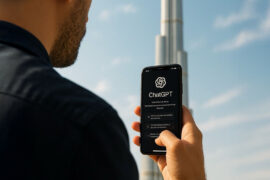The UAE is once again taking a giant leap in the AI race—this time by making Arabic the centerpiece. Meet Falcon Arabic, a groundbreaking AI language model designed to understand and generate Arabic natively. Developed by Abu Dhabi’s Advanced Technology Research Council (ATRC), this model is tailored for the Arab world and positions the UAE as a serious global contender in artificial intelligence.
What is Falcon Arabic?
Falcon Arabic is a large-scale AI language model built specifically for Arabic-speaking users. Unlike traditional models trained on English or translated content, Falcon Arabic has been trained on native Arabic datasets—making it capable of handling different dialects, cultural nuances, and linguistic intricacies of the region.
Why is this Important?
- Language representation: Arabic is the fifth most spoken language in the world, yet often underrepresented in mainstream AI tools.
- Better accuracy: Falcon Arabic is trained on clean, region-specific Arabic data—not just translations—making it far more accurate in real-world usage.
- AI independence: The UAE aims to reduce reliance on Western AI models and build homegrown capabilities.
- Boost to local innovation: Developers in the region can now create AI-powered apps and services rooted in native Arabic understanding.
Who Developed Falcon Arabic?
The model is developed by the Technology Innovation Institute (TII) under Abu Dhabi’s Advanced Technology Research Council. It is an extension of the earlier Falcon models that gained attention globally for outperforming much larger models in efficiency and accuracy.
What Makes Falcon Arabic Special?
- Trained from scratch in Arabic: Not a translated dataset.
- Understands multiple dialects: Including Emirati, Egyptian, Levantine, and more.
- Lightweight yet powerful: Competes with AI models up to 10x its size.
- Open-source-ready: Aimed at encouraging regional developers to build AI solutions for government, education, finance, and media.
Will This Impact Everyday Users?
Absolutely. From Arabic-speaking virtual assistants to AI-powered education, media summarization, and government services, Falcon Arabic can enhance user experience for millions of Arabic speakers in ways global models can’t.
What’s Next?
The UAE plans to make Falcon Arabic accessible to developers and enterprises across the region. This could pave the way for more personalized, culturally relevant AI experiences in the Arab world—something that’s long overdue.
FAQs
Q: Is Falcon Arabic available to the public?
A: Not yet fully public, but the UAE has indicated plans to release it for enterprise and developer use soon.
Q: How does Falcon Arabic compare to ChatGPT or Google Gemini?
A: While tools like ChatGPT are powerful, Falcon Arabic has a clear edge in native Arabic processing, especially in regional dialects and local cultural contexts.
Q: Can it be used for apps or websites?
A: Yes. Falcon Arabic is designed to support developers in building AI apps, chatbots, and services for Arabic-speaking users.
Explore more AI stories from Dubai and the Arab world only on Dubytes.ae
Stay tuned for upcoming reviews, interviews with developers, and deep dives into the future of Arabic AI.
Disclaimer: All posts in this blog are generated by AI. Please do your own research and look into official relevant channels. The idea is to give you latest information through AI view, but Dubytes takes no responsibility.





